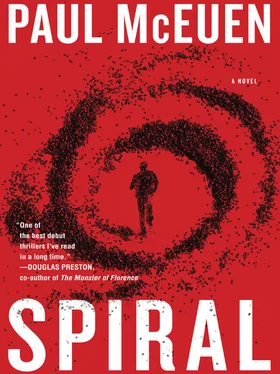“The issue with microbots has always been power,” Jake said, stepping back to center stage. “Quite a few teams built little robots like these for the first Grand MicroChallenge, but they all had the same weakness. They were powered by onboard batteries—tiny cells that run out of juice after a couple of minutes. And you can’t load them with more batteries—they’d be too heavy to move. It was a showstopper. Everyone was stuck.
“Enter Liam Connor. He said to me, ‘No problem, my boy. You just have to teach the little fellows to eat.’ ”
Jake let that settle in before continuing.
“His idea was to create a fungus that could serve as a digester and convert food to energy. He started with something called Ustilago maydis —a fungus that lives on corn, and he added some genes from brewer’s yeast—the stuff that converts sugar to ethanol when you make beer or wine. The Crawler eats by shredding bits of food with its legs and stuffing them into a feeding portal. That portal—its mouth—leads to its stomach—a little chamber filled with the fungus. The fungus breaks down the food and voilà! Fuel. The fuel powers the Crawler, and the Crawler eats some more. It can keep going as long as the food holds out. We call them HungryCrawlers. And they are champions.”
“So what did you do with the DARPA prize money?” a student called out.
Jake laughed. “I still have my share, sitting in the bank. Joe?”
“I bought a house for my parents in China.”
“Dave?”
“I bought stock. Mostly Google and Intel. And a Segway.”
Jake said, “It’s a hazard. He rides it up and down the halls.”
A hand went up, a student down in front, wearing a red Windbreaker and matching high-tops, no more than eighteen years old. “What about intellectual property?” he asked.
“We’ve got seven patents filed,” Jake said. “Three have already been granted.” Jake was always amazed at how quickly the thoughts of today’s students went to the business side. Fifteen years ago, when he was an undergraduate, no one thought about IP, about patents. Now it was different. Kids saw dollar signs everywhere.
“Anyone license it yet?”
“Quite a few. A start-up in Boston wants every home in America to have MicroCrawler mini-Roombas running around. On countertops, walls, ceilings, cleaning away everything from crumbs to cobwebs. A medical technology company in North Carolina hopes to use them as remote surgeons that can work on a patient from the inside, excising tumors or clearing blockages without the need for incisions or the risk of infection. But our biggest suitors are a couple of military contractors. Micro-robotics is going to be the next big thing in warfare. That’s why DARPA ran the Grand MicroChallenge. Small spies, tiny assassins, things like—”
A cellphone went off. Jake was annoyed but not surprised. This happened at least once a class. Jake spotted the culprit fishing the phone out of his pocket. He did his best to shame him with his stare.
The student didn’t notice, fixated on the screen of his phone, an expression of shock on his face. What he did next surprised Jake. He whispered to his neighbors, got up, and headed for the door.
As he was working his way down the row of seats, another student pulled a phone out and started working it with his thumbs. He looked around, whispered to his friend, pointed to the door.
That’s when it really got going. Two more cellphones started ringing. Five times that number silently fished phones out from bookbags, pocketbooks, and knapsacks. More people began to leave. Jake had never seen anything like it.
He glanced at Dave and Joe. Both shook their heads, not knowing what was happening. Dave flipped open his own phone.
A couple of students near the back got up, talking louder now. “It’s Liam Connor,” one of them said, loud enough for everyone to hear.
“What? What about Liam Connor?” Jake asked.
“They just found a body in Fall Creek Gorge,” the student said.
“And?”
Dave closed his phone, face white. “Jake, this can’t be true. They’re saying that the body is Liam Connor’s.”
 5
5 
THE HILLS ON WHICH CORNELL UNIVERSITY STOOD WERE the remnants of the glacial moraine left over from the last ice age. Streams cut through this loosely packed earth and shale until they reached older, solid rock, carving the dramatic gorges and waterfalls for which the campus was famous. Fall Creek Gorge was the deepest, a huge gash in the earth defining the north boundary of campus. It was spanned by a narrow suspension footbridge linking the central part of campus to the houses and dorms farther north. From its midpoint, it was a two-hundred-foot plunge to the rushing waters of Fall Creek below.
Jake always brought the students here later in the semester when he taught “Physics for Presidents.” They stood on the bridge and stared at the water below while Jake gave them a rundown on the geology, describing the advances and retreats of the glaciers that carved out the gorges. Then Jake would give them a little demo. He would take a watermelon and drop it off the bridge. They’d all time it with their watches, the seconds ticking by until it burst on the stones below. Three-point-two seconds was the average answer. They’d compare it to what Newton predicted.
But the real lesson wasn’t Newton’s laws, the acceleration due to gravity, v 2= 2gh . That was a cover. Jake had worked up this field trip after he had lost a student to suicide. Jake knew the statistics. Over the past twenty-eight years, sixteen students had jumped from this bridge. It was a painful fact about a pressure-cooker school like Cornell, but it had hit Jake hard. He still couldn’t forget the parents at the funeral. No parent should ever have to go through that. No kid should ever put their parents through that.
The real lesson of the watermelon was about the violence of falling. The melon splattered, bits of red flesh streaking out like the sun from the point of impact. Potential energy turned into kinetic, velocity growing with every second of the fall. He brought the class here every semester to see what would happen when you went over. Cut through the romanticism and get down to the reality. You jump, you fall, you hit.
Three-point-two seconds. Blam .
MORE PEOPLE WERE ARRIVING BY THE SECOND, MORE STUDENTS, more faculty, more police. They were coming from all across campus. Jake had joined the rush, running over from the Schwartz Auditorium lecture hall. If it truly was Liam Connor, Jake didn’t think it would stop until the entire campus was clustered up against the gorge.
Liam Connor was an icon. He’d been at Cornell for sixty years, was known to every student, faculty member, and alumnus. He was in many ways the face of Cornell, the last of the pivotal scientists—people like Hans Bethe, Richard Feynman, Carl Sagan, and Barbara McClintock—who had turned a sleepy central New York town into one of the most important centers of science in the world.
Jake kept flashing to the last time he’d seen Liam—yesterday, lunch at Banfi’s. They were both in a hurry. They’d chatted about a recent experiment; a guy at Caltech had come up with a way to make a strand of DNA assemble itself into a smiley face only fifty nanometers across. Not just one but billions and billions, all floating around in a single little test tube. “The most concentrated solution of happiness ever made,” Liam had joked. Liam was beaming. His own discovery, someone else’s, Liam barely seemed to notice the difference. He loved every new development, every step up the scientific ladder.
Читать дальше

 5
5 










